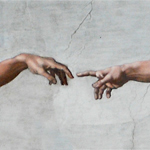 “Why does religion exist?” is a challenging question for both the natural and the social sciences. There is a fact to be explained: a large majority (about 85%) of human beings profess religious beliefs and engage in religious practices. For evolutionary biology, the challenge is to explain why religion caught on so well. Did religions confer a competitive advantage on the members of our species who adopted them? If they once did, do they still confer a competitive advantage? Although a ‘gene for religion’ is unlikely, religious affiliation is heritable: the strongest determinant of an individual’s religion is the religion of his parents. [Dennett, 2006, p 86] Religious observance is costly, requiring the erection of places of worship and maintenance of a priesthood, and could be presumed on that account to reduce the evolutionary fitness of believers as compared to their more worldly competitors. Why, then, have religions flourished? Almost the same question confronts economic theory, which assumes human behaviour is best modelled by Homo economicus, an agent who always chooses what he believes is in his own interests. Why would such agents choose religion, which requires personal sacrifice with no clear payback, or at least without the kind of payback that motivates the same agents in their other transactions such as work for pay and pay for groceries. A parallel question faces psychology. Religions commonly advocate self-denial, which can be presumed to be psychologically repellent. Why are people attracted by institutions and practices which ask them to give up pleasures?
“Why does religion exist?” is a challenging question for both the natural and the social sciences. There is a fact to be explained: a large majority (about 85%) of human beings profess religious beliefs and engage in religious practices. For evolutionary biology, the challenge is to explain why religion caught on so well. Did religions confer a competitive advantage on the members of our species who adopted them? If they once did, do they still confer a competitive advantage? Although a ‘gene for religion’ is unlikely, religious affiliation is heritable: the strongest determinant of an individual’s religion is the religion of his parents. [Dennett, 2006, p 86] Religious observance is costly, requiring the erection of places of worship and maintenance of a priesthood, and could be presumed on that account to reduce the evolutionary fitness of believers as compared to their more worldly competitors. Why, then, have religions flourished? Almost the same question confronts economic theory, which assumes human behaviour is best modelled by Homo economicus, an agent who always chooses what he believes is in his own interests. Why would such agents choose religion, which requires personal sacrifice with no clear payback, or at least without the kind of payback that motivates the same agents in their other transactions such as work for pay and pay for groceries. A parallel question faces psychology. Religions commonly advocate self-denial, which can be presumed to be psychologically repellent. Why are people attracted by institutions and practices which ask them to give up pleasures?
All the world’s major religions try to curb human selfishness. They attempt to break their followers’ obsession with their personal lives, and encourage them to care about something larger than themselves. An aim of religion is to alter human motivation: to guide thought and motivate action in directions that run counter to ‘natural’ inclinations.
I want to examine the hypothesis that religion arose as a response to the emergence of the self as a motivational centre in human psychology. Continue reading “Religion as an Antidote to the Self”


